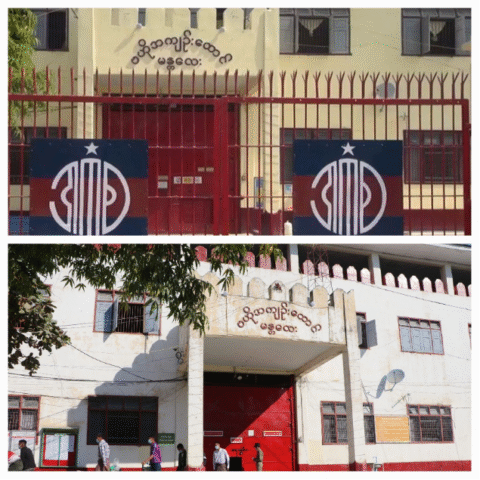An interview with Ma Zu Zu May Yun, Spokesperson of Women’s Organization of Political Prisoners (WOPP), on the military council’s amnesty, the causalities from the powerful earthquake, and oppression in prisons
The Political Prisoners Network-Myanmar (PPNM) reported that 378 political prisoners were released on 17 April, the first day of the Myanmar New Year, following an amnesty granted by the military council.
The PPNM said that 221 male political prisoners and 157 female political prisoners were released from 33 prisons nationwide.
A powerful 7.7-magnitude earthquake centered in Sagaing and Mandalay on 28 March caused the collapse of several old buildings in Mandalay’s Obo Prison, resulting in the deaths and injuries of prisoners.
The female political prisoners’ group issued a statement confirming that 10 male political prisoners and 10 female political prisoners were among the injured. The earthquake also claimed the lives of at least 30 political prisoners.
The Than Lwin Times interviewed Ma Zu Zu May Yun, Spokesperson of the WOPP, about the military council’s amnesty, the casualties from the powerful earthquake, and the ongoing oppression in prisons.
Q: Could you provide an update on the current conditions of prisoners in jails across the country?
A: There is a severe water shortage, and regulations have been tightened on the import of medicines and medical supplies. In addition, prisoners are suffering from skin diseases and struggling with a lack of essential medications.
Q: What percentage of political prisoners are included in the military council’s amnesty lists granted on significant occasions such as Independence Day and the first day of the Myanmar New Year? Why do you think the number of political prisoners has decreased?
A: On occasions like Independence Day, the military council rarely includes political prisoners in its pardons or amnesty. Most of those granted amnesty are prisoners who are close to completing their sentences. Political prisoners serving life sentences or facing the death penalty, as well as those charged under Section 50 (J) of the Counter Terrorism Law, which carries long sentences, and Section 505 of the Penal Code, are rarely included in these releases. The percentage of political prisoners granted amnesty by the military council is extremely low, with estimates suggesting that only around 4% were released on New Year’s Day.
Q: Due to the powerful earthquake that occurred last month, some prison buildings collapsed and were damaged, so what is the situation regarding prisoners being harmed or killed?
A: Obo Prison in Mandalay has faced the most severe casualties among political prisoners due to the collapse of buildings caused by the recent earthquake. Other prisons are experiencing information blackouts, making it difficult to obtain accurate details. Reports indicate that the military council and the Prisons Department are keeping political prisoners in the collapsed buildings at Obo Prison, though the ongoing information blackout has made it challenging to confirm the full extent of the situation.
Q: Previously, there was inadequate medical care inside the prisons, and now, with the damage caused by the earthquake, what difficulties are there regarding the medical issues faced by the quake-affected prisoners?
A: In addition to the already inadequate medical care, the situation for political prisoners affected by the recent earthquake has become even worse. We have heard that for certain, there are restrictions on family visits, and prisoners are also being denied the right to receive medical treatment outside prison.
If they are kept in the collapsed buildings, how much danger to the lives of political prisoners will they have to endure? Currently, political prisoners, who are denied even the basic right to possess a single needle, are not only facing the risks posed by natural disasters but are also being threatened with transfers to other prisons by the military junta. These threats have been reported.
Q: What kind of oppression do male and female political prisoners face in prisons?
A: Political prisoners are being denied medical treatment, and there are threats of being transferred to remote locations if any information from inside the prison is leaked. The prison authorities and the military junta are not only openly violating human rights, but the threats they impose on political prisoners—who are already dealing with the impact of natural disasters and ongoing anxieties—can be seen as a form of psychological torture.
Q: How severe is the oppression faced by prisoners in prisons across the country?
A: There are 41 prisons across Myanmar, that currently hold political prisoners, with over 20,000 male and female inmates. These prisoners are enduring the harsh realities of prison life, which is notoriously difficult and brutal. Even in times of crisis, such as the recent earthquake disaster, political prisoners—including those sentenced to death, life imprisonment, or imprisoned under Section 505 and various other charges—continue to suffer, often facing torture and solitary confinement. The military junta is keeping these prisoners in old, deteriorating buildings, putting their lives at even greater risk. I urge that these prisoners not be held in such unsafe conditions.
Sent by Than Lwin Times

